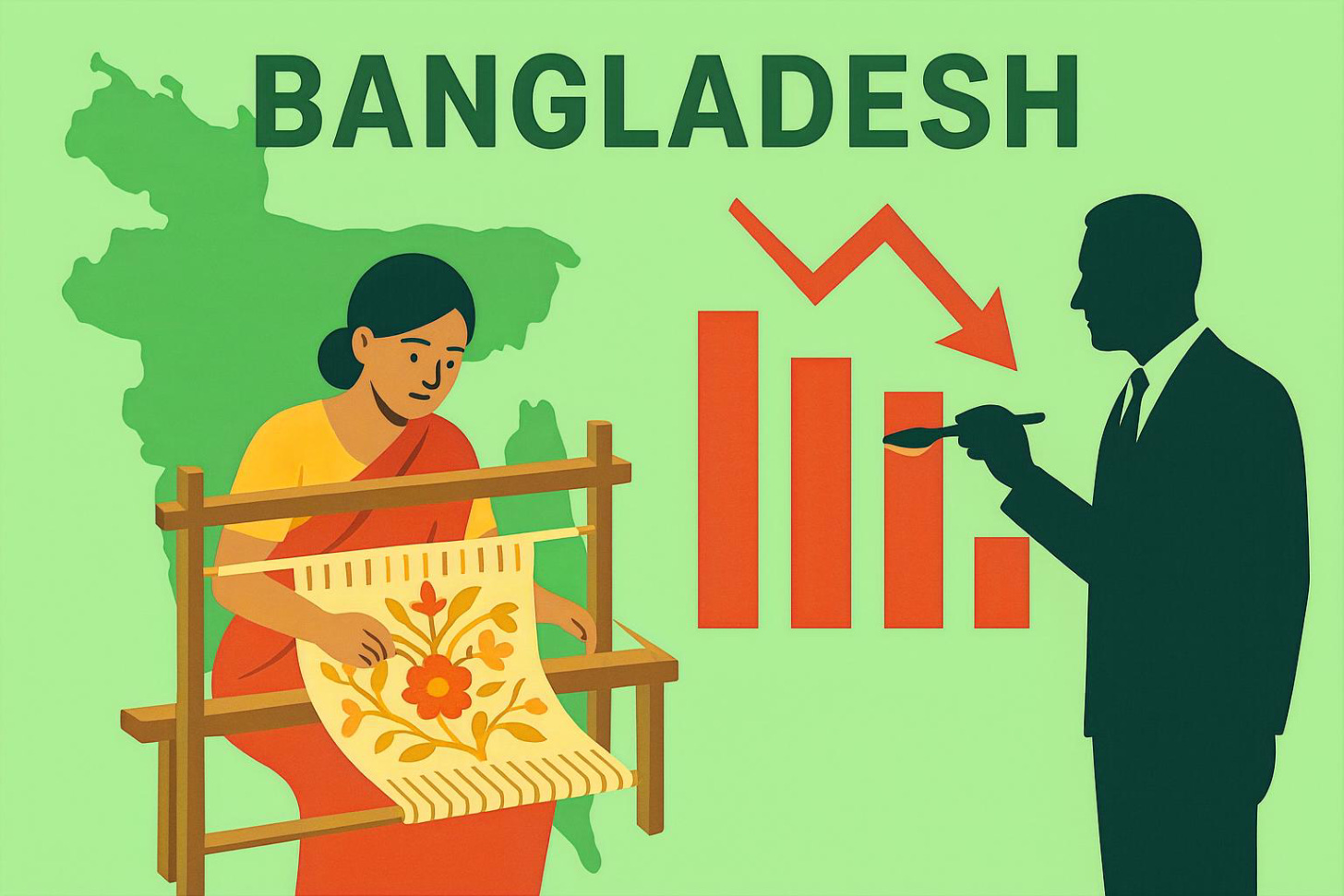'Economy on the Line, Politics Looks Away'
Bangladesh’s RMG sector, like Arachne’s weaving, is its strength yet vulnerable. Despite US tariff risks, politics fixates on power, neglecting economic issues and needed public literacy.
বাংলাদেশের রাজনৈতিক দলগুলো জুলাই গণঅভ্যুত্থানের পর থেকে সরকার ব্যবস্থার কাঠামোগত পরিবর্তন নিয়েই বেশি আলাপ-আলোচনা করেছে। এই সময়ে দেশের অর্থনৈতিক ইস্যুগুলোতে তাদের তেমন কোন তৎপরতা চোখে পড়েনি। যুক্তরাষ্ট্র কর্তৃক বাংলাদেশের উপর শুল্ক আরোপ ইস্যুতে রাজনৈতিক দলগুলোর ভূমিকা ছিল অনেকটা নীরব দর্শকের মতো। এই অনাগ্রহ বাংলাদেশের রাজনীতির সাথে অর্থনীতির দুরত্ব তৈরি করছে যা ভবিষ্যতের জন্য উদ্বেগজনক।
The current situation of Bangladesh’s RMG sector reminds us of the Greek mythological rivalry between Arachne and Athena. Arachne was a great weaver- even gods were unmatched by her. One day, Arachne boastfully challenged the goddess Athena to a weaving contest, and Athena lost the competition as Arachne made a spectacular tapestry surpassing the skill of the goddess. This enraged Athena. Out of anger, she tore the beautiful tapestry of Arachne and transformed her into a human-like spider.
Similarly, Bangladesh’s greatest economic strength is, metaphorically, the weaving skill, which has put us at the mercy of a mighty force. The RMG sector is the country’s economic heart. For many years, Bangladesh has been a leading RMG exporter around the world. However, the currently imposed 35% US tariff was about to squeeze its energy out, but as of now, we have managed to settle at 20% after rounds of negotiation with the USA. If this sector fell, there are solid grounds to conclude that the country would immediately lapse into economic chaos.
Surprisingly, during this negotiation, political parties had hardly addressed the issues in their political efforts except BNP. BNP sat for a meeting with the business leaders and pledged to help the government in negotiation talks with the USA. NCP, Jamaat-e-Islami, and other prominent political parties, in their fierce speeches and bustling political activities, scarcely talked about the issue. After the reduction of the tariff, political parties just lauded Trump customarily, and some demanded to disclose the negotiation points.
Not only this issue- other economic issues are also overlooked by the political parties. Since the 5th of August 2024, we haven’t heard much from the political parties about how they are going to reshape the country’s economy or what their plan is for the economy. Political parties are more concerned with the reformation of the constitution, voting system, and other political institutions, but seem ‘not interested’ in the country’s economy, as if the economy were not part of politics. Their debates and attention are all about political matters. The student leaders and Islamist parties, eager to join in the statecraft through the upcoming election, are silent about their economic propositions to the mass people. We still have no idea what they offer us economically, though we know relatively a lot about their political propositions. Moreover, their political discourse holds very little about the country’s economic situation. Their demands and points of movement do not address the economic issues the country is facing. This situation is deeply unfortunate for a country that emerged as a separate, independent nation- according to many- because of the ‘Six-Point Movement,’ whose major demands were related to East-Pakistan’s economy and which is often regarded as the country’s ‘Magna Carta’. But today’s silence is daunting.
Some statistics will delineate the situation vividly. According to Global Protest Tracker, as of the date of writing, 902 protests are ongoing around the world, of which 320 protests- in other words, more than 35%- are related to the economy. More interestingly, among those 320 protests, 170- more than half of them- are somehow connected to political parties. A study that gathered data from 2006 to 2020 on the key protest issues of the 21st century found that ‘grievances over economic injustice’ caused the second-highest number of protests around the world. South Asia, where now more than 1.6 billion people live, saw the lowest number of protests- only 16- regarding economic issues, while the highest number was 120 in the Europe and Central Asia region, where now more than 928 million people live. This gives us a glimpse that economic issues are less converted into matters of protest in this region; in other words, economic issues are less of a matter of politics here.
Similarly, Bangladesh’s economic issues are often overlooked by the politicians, though it is one of the sufferers of high economic injustice among other countries in the globe. Ironically, in this very country, the demand for fair employment caused a 15-year-long autocracy to fall, which further implies the necessity of political attention to economic matters.
This relative silence of the political parties about the economic arena is keeping the people unaware of the fragile economic condition of the state. It is presumed that economic literacy is very low among the populace. This disables people from making informed economic decisions in their everyday life, impacting the country’s overall macroeconomic condition negatively. Political parties, hence, should be more vocal about economic matters and promote economic literacy among the people.
About the Author:
Jahidul Islam is an activist and an MSS student in Government and Politics at Jahangirnagar University. He can be reached at jahidmn3@gmail.com
Disclaimer: The views expressed in this article are the author's own and do not necessarily reflect The Insighta's editorial stance. However, any errors in the stated facts or figures may be corrected if supported by verifiable evidence.



